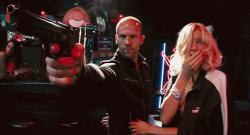Over at my day job, I've done new interviews with Wong Kar Wai ...
The visual style of your films [shot with DP Christopher Doyle] — the saturated colors, the way the camera moves, looking through glass or at reflections — is very much present in My Blueberry Nights. What specifically is in the frame, how should the colors look — is that a conversation that you had with [DP] Darius Khondji?... and Manda Bala director Jason Kohn, whose film I caught up with -- and liked a lot -- after watching it win big at the Cinema Eye Awards last month.
WONG KAR WAI: Not so much about that. Darius is a very sensitive DP and very talented. And also, given the schedule and the locations that we shot in, it seems to me the final look of the film was a natural choice. When we shot in New York, the restaurant was so small it was hard to squeeze in all these cameras and a big crew, so we shot mainly [from] outside. It also makes sense to the story, because at that point we are still behind something, to observe what’s going on. And then the frame of the pictures — New York is pretty much like Hong Kong. It’s a vertical city, with vertical lines. And then when the character Elizabeth moves on to other parts of the country, we see the vertical lines become horizontal. And that’s why we shot in Cinemascope [2.35:1 aspect ratio].
We don’t talk much about the framing of things, because I think framing is something the director should be responsible for. It’s a matter of choice, a point of view. And the rest I just leave to Darius.
A lot of documentaries these days seem to be made to argue a specific political point of view. It's like an instrument for mounting an argument rather than —
Somebody from the PBS POV blog [POV series producer Yance Ford, in this post] mentioned that the lowest-rated POV show is seen by more people than 99 percent of the theatrically released documentaries out there. It's a really important point. I don't believe activism is a necessary or even a very useful part of the nonfiction film genre. I don't think nonfiction films were born out of an activist tradition and, quite frankly, I don't think it's an effective forum for activism.
So you don't see your motivation in making your film as activist at all? Or trying to catalyze change?
Absolutely not. No way whatsoever. Let's say the activist's dream scenario came true, and Jader Barbalho was ousted from power, which is the only specific goal that one could possibly, in an alternate reality, expect this movie to have. Nothing would change. The problems in Brazil are institutional. This wasn't about trying to effect change, because I genuinely don't believe documentary film is a great form for that. But I do think it's an important historical marker. It exposes very real connections between large-scale political corruption and violence. But first and foremost I made a film. My personal politics are in there because they are my politics, but I was way more driven by the oddness of the frog farm, the ingenuity of the plastic surgeon, and the opportunity to film in a city that I didn't think many people really understood was as rich or powerful as it is.















Leave a comment